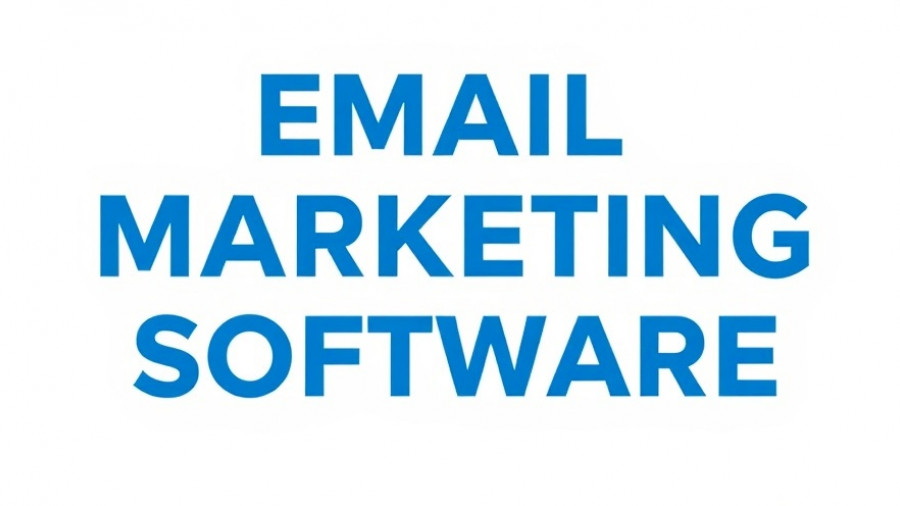
Unveiling the Best Email Marketing Tools for Financial Services in 2025
Email marketing has emerged as a crucial strategy for financial service businesses looking to build trust and maintain client relationships in an increasingly competitive and regulated landscape. As we approach 2025, the importance of choosing the right tools for email marketing cannot be overstated. This article explores the top email marketing solutions tailor-made for the unique demands of financial service providers.
Why Email Marketing Matters for Financial Services
In the world of finance, effective communication can mean the difference between acquiring and retaining clients. Email marketing, when executed correctly, allows financial advisors and service firms to deliver personalized, compliant, and timely content to their clients. A recent report highlighted that over 72% of clients prefer receiving important information via email, affirming the channel's effectiveness.
Key Features to Look for in Email Marketing Tools
For financial services, it's essential to consider tools that not only facilitate communication but also adhere to compliance regulations and offer robust features such as:
- Automation: Tools should support automated workflows that send timely messages based on client actions or predefined schedules.
- Segmentation: Being able to segment users based on their financial services helps tailor messages and improve engagement.
- Compliance Management: Platforms need to integrate features that ensure all communications remain compliant with financial regulations.
- Reporting and Analytics: Effective reporting tools to measure engagement and ROI are critical in demonstrating the success of your campaigns.
The Top Email Marketing Tools for Financial Services in 2025
Let’s take a look at the best email marketing tools for financial service businesses, as identified through extensive reviews and feature evaluations.
1. HubSpot
Known for its versatile capabilities, HubSpot offers a free tier that is particularly appealing for small to medium-sized financial firms. Its CRM integration allows seamless communication management, making it easier to track interactions and respond to client needs promptly. The platform's built-in compliance features and marketing automation capabilities streamline operations significantly.
2. ActiveCampaign
For companies that require sophisticated email marketing automation, ActiveCampaign stands out. It allows for advanced client scoring and multi-channel communication, including SMS, ensuring timely and multifaceted outreach strategies for financial advisors.
3. Constant Contact
Ideal for firms needing a user-friendly interface, Constant Contact offers extensive templates and event marketing capabilities. Its simplest tier also comes with features relevant for compliance-sensitive industries, making it a great choice for finance professionals.
4. Mailchimp
This well-known platform provides excellent tools for creating and managing targeted campaigns. Its CRM component further enhances the functionality, supporting financial sectors looking to automate routine communications such as appointment reminders and educational content distribution.
5. GetResponse
Offering an integrated webinar hosting feature, GetResponse makes it easy for financial advisors to conduct educational sessions that can enhance client engagement. Its marketing automation capabilities allow for successful lead nurturing and client relationship strengthening.
Breaking Down the Choice: Pros and Cons
While these tools are leading the pack, understanding their strengths and potential drawbacks is crucial for making informed decisions about which fits best for a specific firm's needs.
- HubSpot: Pros include free CRM and extensive feature sets; however, some pricing options can get complex with growth.
- ActiveCampaign: Its automation prowess is unmatched, yet it does come at a slightly higher price point, especially for comprehensive features.
- Constant Contact: Easy to use with strong support, but automation features may feel limited compared to more robust platforms.
- Mailchimp: Offers a wide range of resources for free accounts, although pricing can escalate with large contact lists.
- GetResponse: Great for those looking into webinars, but moving up tiers for advanced automations requires more investment.
Best Practices for Implementing Email Marketing
Having the right tools is just the first step. Implementing an effective strategy is where email marketing truly shines. Some best practices include:
- Start with Segmenting Your Audience: Tailor messages based on specific client needs and profiles.
- Personalize Your Content: Utilize the insights to craft messages that resonate with clients, building trust and enhancing engagement.
- Automate Wisely: Implement automated campaigns for onboarding, reminders, and regular updates but ensure the content feels personalized.
- Monitor and Optimize: Use engagement data to continually refine your strategies for improved performance.
Conclusion: Empowering Financial Relationships Through Email
Email marketing is not just about sending messages; it's about fostering relationships and ensuring clients feel valued and informed. With robust tools at your disposal and a strategic approach, financial service businesses can leverage email marketing to build trust, enhance communication, and ultimately drive growth. Take action today by exploring these platforms and setting up your tailored email marketing strategy to strengthen your client connections!
 Add Row
Add Row  Add
Add 



Write A Comment